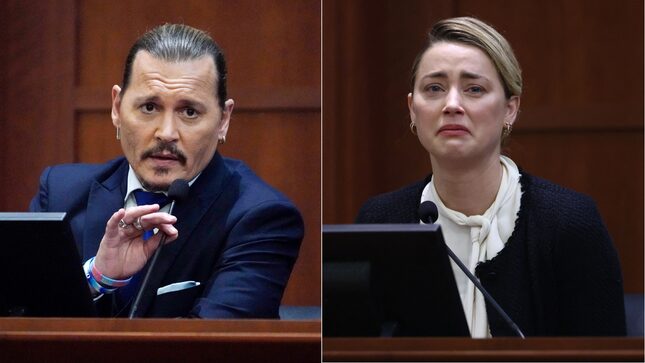Male survivors of domestic and sexual violence exist, and are all too often dismissed by our patriarchal culture. Men, too, are more likely to experience sexual abuse than be falsely accused of it. At the same time, I’ve found the use of the term “mutual abuse” to broadly undermine Heard’s allegations of sexual assault and beatings from her partner concerning. The more I saw Depp’s supporters deploy this term, the more I was struck by how it seemed to emerge from a dangerously juvenile analysis of power dynamics that allows men to hit women as true gender equality.
“The term mutual abuse is by and large not supported by most domestic violence advocates as being valid, because the core of domestic violence, of course, is to have power and control over another person,” Amanda Kippert, director of editorial at Domestic Shelters, told Jezebel. Domestic Shelters offers an online network and directory of shelters throughout the U.S. and Canada, as well as a helpline for victims seeking support.
Abuse, Kippert notes, is “typically a calculated and repeated, ongoing cycle of power and control over someone” that often escalates over time, to a point where the victim is pushed to say and do things they otherwise wouldn’t. “To accuse two people of doing this to each other simultaneously—it doesn’t happen like that,” Kippert said. “What is far more likely is that most victims accused of being mutually abusive are just having emotional or even physical reactions to the abuse that they’re suffering. Abusive partners will then accuse their victims of being abusive, in order to shift the blame as a form of gaslighting.”
The term mutual abuse is by and large not supported by most domestic violence advocates as being valid.
Ruth Glenn, president of the National Coalition Against Domestic Violence, also tells Jezebel mutual abuse “does not work when we’re talking about domestic violence,” noting that “there is always someone who is the primary aggressor.”
“Sometimes victims respond with violence, or even encourage the violence so they can get it over with, knowing that it’s going to happen,” Glenn explained. “It’s so complex, and that term, ‘mutual abuse,’ is very harmful.”
A reaction to abuse, Kippert agrees, isn’t abuse. Yet when abusive acts escalate to a point where victims respond with violent resistance or self-defense, there’s a history of those who seek help from law enforcement ending up arrested or criminalized by police officers; officers are often ill-equipped to determine the primary aggressor in abusive relationships. A 2020 survey found 24 percent of women who have called the police to report intimate partner violence say that they themselves were arrested or threatened with arrest—contributing to the sexual assault-to-prison pipeline. (Ninety percent of incarcerated women have survived sexual violence.) The spread of misinformation about mutual abuse as a result of Depp and Heard’s defamation trial could put victims at even greater risk of punishment, disbelief, and dismissal, Kippert says.
While interest in the term “mutual abuse” has skyrocketed over the course of the trial, Kippert notes that the impulse to find any reason to write off women who say they were harmed isn’t new. Women who don’t meet our sexist, racist, classist, ableist, and heteronormative expectations of a “perfect victim” have always been dismissed or attacked.
“There’s this idea that a victim needs to be this sort of meek, quiet, complacent victim, so when someone fights back, uses a self-defense tactic, or God forbid, has an emotional reaction, we say, ‘Well, can she can’t possibly be telling the truth,’” Kippert said. “When people say this was ‘mutually abusive,’ they’re really saying this choice or that choice by Amber Heard invalidates everything that she’s accused Johnny Depp of.”
According to Glenn, calling victims’ responses “mutual abuse” can amount to victim-blaming. “That’s the chilling effect of this, because people will see how we’re talking about Amber and think, ‘I’ll get blamed for it. I’m not going to come forward.’” The public reaction to the trial, Glenn says, will impact not just Heard, but women and abuse victims broadly, from all walks of life. “They’re watching this in the background on the TV, or opened TikTok and saw some of those horrible images and mockery, and it really prevents them from coming forward.” Already, the overwhelming majority of sexual assaults are unreported.
The uniquely high-profile nature of the trial and its ramifications for everyday victims isn’t lost on Kippert, who also believes that the positioning of Depp as a sort of martyr, not just among online men’s rights extremists but increasingly in the mainstream, stems from a broader issue of the “idolizing” of celebrities. “For a lot of fans, it’s inconvenient for us to believe that a celebrity we like is guilty—we’ve seen this many, many times before,” she said, “and it’s incredibly harmful.”
Amid the Depp-Heard trial, the loudest purveyors of the “mutual abuse” argument—Depp’s legal team and his fervent fans—have ultimately chosen to ignore altogether how the ability to abuse someone requires power over that victim in the first place.

